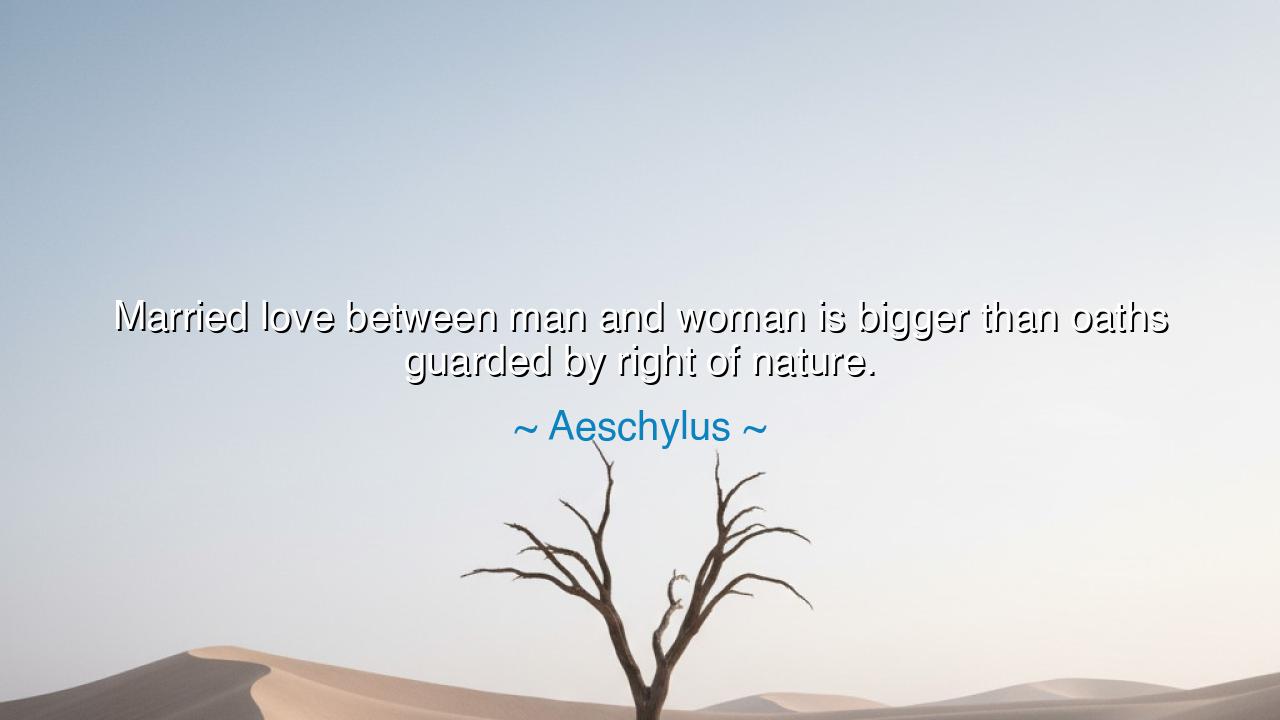
Married love between man and woman is bigger than oaths guarded






Hear the ancient voice of Aeschylus, father of Greek tragedy, who declared: “Married love between man and woman is bigger than oaths guarded by right of nature.” In this utterance, the poet reaches into the deepest laws of human existence, and proclaims that love, when sanctified in the bond of marriage, surpasses even the primal obligations dictated by nature itself. For oaths bind men by duty, but love binds souls by choice; and what is chosen freely with the heart is greater than what is demanded by the order of the world.
To say that married love is bigger than oaths is to elevate the union of man and woman above mere contracts and duties. Oaths, in the ancient world, were sacred, sworn by gods and by earth itself. To break them was to invite ruin, for nature and divinity bore witness. Yet Aeschylus declares that there is something even greater, something mightier than any oath: the covenant of two souls joined in lifelong fidelity. For in marriage, it is not law that binds but love, not compulsion but devotion. Such a bond is deeper than nature’s command, for it springs from the eternal within man and woman.
The Greeks themselves bore witness to this truth in their myths and tragedies. Recall the story of Alcestis, wife of Admetus. When Admetus was fated to die, it was Alcestis who offered her life in his place. Neither oath nor law compelled her—only love. Even the gods marveled, and Heracles descended to wrestle Death itself, restoring Alcestis to the world. Here we see the living proof of Aeschylus’ words: that married love is not bound by natural law, not even by death, but rises above it in sacrifice and devotion.
We see it also in history. Consider Marcus Aurelius, emperor and philosopher, whose meditations speak of reason and duty. Yet when his beloved wife Faustina died, he grieved not as a ruler bound by stoic law, but as a husband bound by love. His writings reveal that, though he governed an empire by logic, his heart knew a truth greater than politics or philosophy: that the love between man and woman transcends all earthly compacts. Even Rome’s laws bowed before the grief of a husband who had lost his wife.
The meaning of Aeschylus’ words is also a warning. For in an age when promises are broken lightly, when contracts bind more than hearts, we are tempted to think oaths and legalities are the highest obligations. But the tragedian reminds us that there is a holier bond, one not written on parchment but inscribed upon the soul: the covenant of married love. If this bond is forgotten, if it is treated as lesser than mere duty, then humanity forgets its own greatness, and families—foundations of society—are shaken.
The lesson is clear: cherish and protect the love that binds man and woman in marriage. Do not treat it as common, nor let it be overshadowed by lesser duties. Remember that it is more sacred than any oath, for it is the joining of two lives into one, the weaving of destinies, the creation of a union that mirrors eternity. If you are married, guard this bond as your highest trust. If you are not, honor it in others, and prepare your heart for it with reverence.
So I say to you, O children of the ages: remember Aeschylus’ teaching. Oaths may command respect, and nature’s laws may demand obedience, but the love of husband and wife stands higher still, for it is not imposed but freely given, not guarded by force but sustained by devotion. It is the bond that builds homes, raises children, and endures even unto death. To honor it is to honor life itself. To despise it is to diminish the very heart of humanity. Guard it, nourish it, and let it shine brighter than all other duties, for it is the greatest covenant under heaven.






AAdministratorAdministrator
Welcome, honored guests. Please leave a comment, we will respond soon